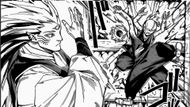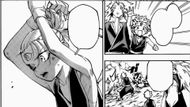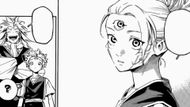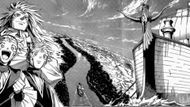Jujutsu Kaisen Modulo Chapter 8 begins with a line that asks its readers to sit with it for a minute before they continue reading the chapter itself. Gege has set the stage for this instalment to be lore-heavy, and it does not disappoint. Additionally, Chapter 8 showcases the creator's ability in worldbuilding as it shows us an important flashback of Cross and Maru.
The story of Jujutsu Kaisen Modulo Chapter 8 feels more like a morally complex story, which gives us a perspective on how the alien race thinks. It also mirrors the themes of human nature that Gege Akutami has always explored.
A window into Samurian civilization

Jujutsu Kaisen Modulo Chapter 8 starts by showing us the Samurian (alien race) homeworld. It is set in a time long before the incident that destroyed it. We see their world has a harsh, barren landscape where the Lumarian tribe has its struggles and works hard to survive.
Cross and Maru are young during this time and part of this tribe. The reason this happened is that the Disgante, who are considered to be more advanced people, exiled them.
Akutami has shown us an honest yet brutal image through them by introducing the concepts of being divided by race, ideology, and faith in a higher power that seems indifferent to mortal suffering.
The chapter continues to explore the myth of a beast that had eaten everything and everyone except those who are of Lumarian blood. This religious paradox becomes the ideological seed that defines the Lumarian-Disgante conflict.
The Canal and the dream of unity

This chapter introduces us to a character known as Doula, who is a wise man who chooses to adopt Maru and Cross. In Jujutsu Kaisen Modulo Chapter 8, it is shown that Doula has one dream in life, and that is to build a canal. This would be a bridge between the two tribes.
This act of building a bridge is literal and symbolic, as he has a strong belief in peaceful coexistence. In simple terms, his belief is simple but powerful: if both sides share something tangible, like water and trade, they can begin to understand one another.
Because Cross is still haunted by his past, he cannot accept this ideology and strongly feels the other tribes are bad, and trying to form any kind of diplomatic relation would be an act of dishonor to his parents.
Meanwhile, Maru chooses to side with Doula as he believes that the act of forgiving could be an important step in fixing their world. Their ideological divide becomes the emotional spine of Jujutsu Kaisen Modulo Chapter 8, with Doula caught in between, embodying the painful truth that peace often demands compassion for one’s oppressors.
Cross’s transformation and Akutami’s message

The true brilliance of Jujutsu Kaisen Modulo Chapter 8 lies in how it reframes Cross’s worldview. His character, for the longest refuses to change his ideals, but when he saw others mocking Doula and his progress, something changed within him.
He realized that the Doula’s philosophy might not be mature, but there is some weight to it. As the canal was almost completed, everyone seemed to be open to the idea of accepting peace.
But in true Gege style, this sense of peace lasted for a second as tragedy struck, which led to the Disgante chief’s daughter being killed. Everything that the trio had worked for is now reduced to nothing.
Jujutsu Kaisen Modulo Chapter 8 shows the importance of reflection

This chapter might not be appealing to all readers, but it is arguably one of the best backstories written by the creator. We got some great worldbuilding as the panels were intricate and showed us an alien world that felt unique yet somewhat relatable.
Moreover as Chapter 8 also spoke about themes of race, ideologies, and explored the lives of aliens before they came to Earth, giving the readers more context about their situation and why the characters behave the way they do.
